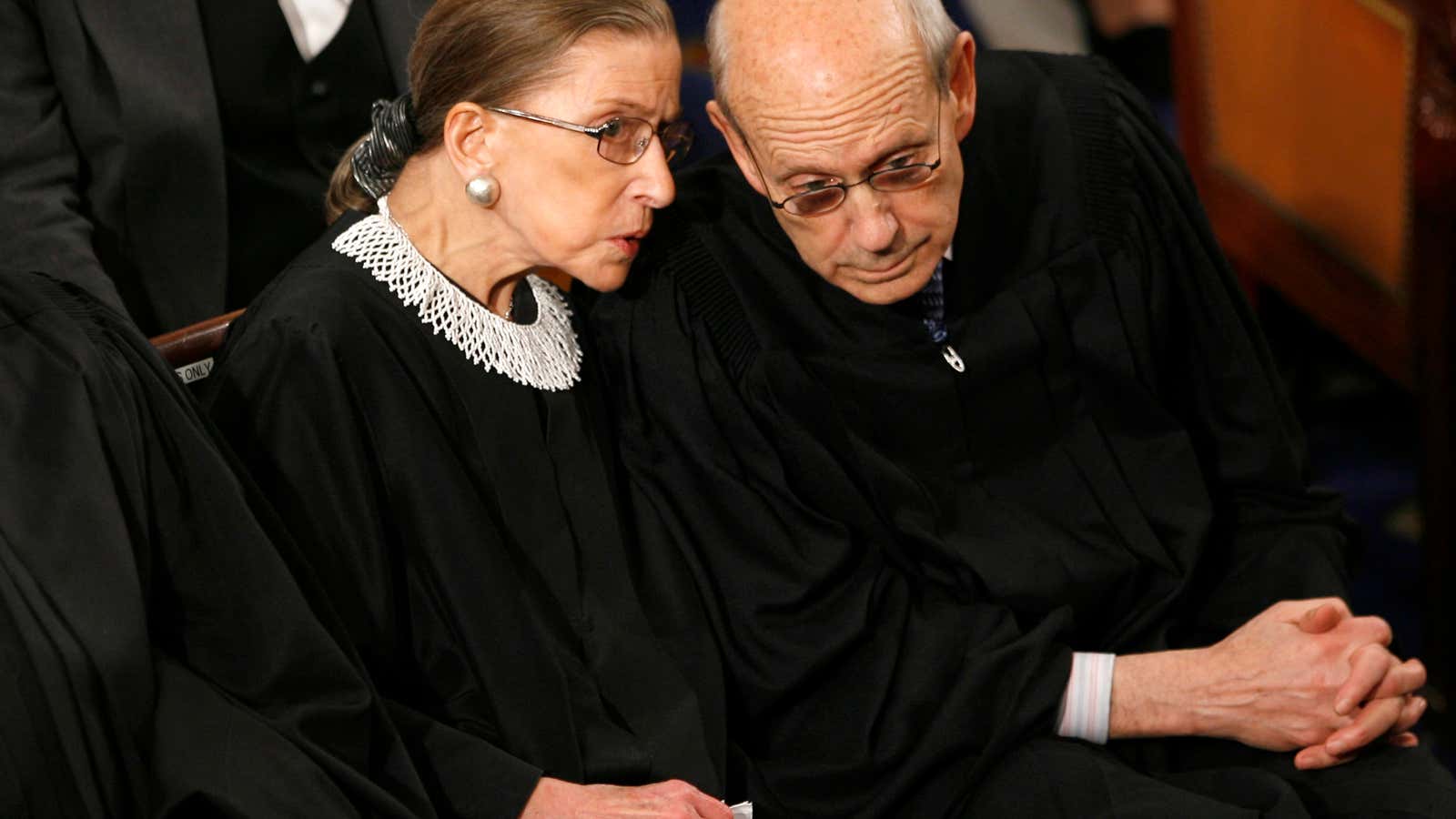With the death of justice Ruth Bader Ginsburg, the US Supreme Court may have lost its least business-friendly member.
In a 2015 paper, political scientist Lee Epstein, of Washington University in St. Louis, and her colleagues analyzed the US Supreme Court’s tendency to rule in favor of businesses, using data from 1946 to 2015 and looking only at cases where a business was either petitioner or respondent but not both—meaning that a business was represented on only one side of the case. By doing so, the researchers created what they call a “Business Favorability Index” for the Court, which has been rising over time. They conclude that the current Court, led by Chief Justice John Roberts since 2005, “favor[s] business at levels unprecedented in the last 70 years,” siding with business 61% of the time, and that “it is fair to continue to characterize the Roberts Court as ‘pro-business.'”
Ginsburg was the least likely of the current Court to side with business, according to this dataset.
Looking only at closely divided cases, the ranking changes, with liberal justice Sonia Sotomayor least likely to side with business, followed by a near-tie between fellow liberals Stephen Breyer and Ginsburg. Because the study was published in 2015, conservatives Neil Gorsuch and Brett Kavanaugh are not included. The dataset also includes considerably fewer cases for the more recently appointed liberals Elena Kagan and Sotomayor. And because different justices serve at different times, the cases included differ across justices.
Despite her position on the chart, Ginsburg was hardly anti-business by this measure.
“The four Democratic appointees serving on the Roberts Court are far more business-friendly than Democratic appointees of any other Court era,” the researchers write. “Even more surprising, the Democrats vote in favor of business at significantly higher rates than Republican appointees in all the other chief justice periods since 1946.”
One interpretation of this finding is that Democratic nominees to the Supreme Court shifted rightward on economic issues as the “law and economics” movement swept the legal profession. Another, put forward by Jonathan Adler, a professor at Case Western Reserve University School of Law, is that the increase in business-friendly rulings is driven by more business-friendly lawmaking by Congress.
“The Roberts Court appears to be taking its cues from Congress,” Adler writes in a 2017 article, noting that the Court’s pro-business record is driven more by statutory rulings than constitutional ones. “Insofar as Congress enacts statutes that are amenable to business interests, the Roberts Court will not stand in the way. Yet insofar as Congress enacts laws with a more populist streak, or that otherwise constrain business activity, the Roberts Court will enforce these provisions as well.”
It may also be that the Business Favorability Index misconstrues the Court’s true impact, both by ignoring the specifics of each case and by weighting every case equally. In a 2012 decision, the Roberts Court ruled 5-4 against the National Federation of Independent Business to uphold the Affordable Care Act, President Obama’s signature health insurance expansion. And in 2007, in Massachusetts v. EPA, the Roberts Court ruled 5-4 that states and cities could sue the federal government for failing to regulate greenhouse gas emissions.
These landmark cases show up as just one data point each in Lee and her colleagues’ analysis, even though they could play a major role in defining a Court’s legacy toward business. For that reason, Lee and her colleagues’ analysis risks potentially misrepresenting the recent Court’s true impact.
“Massachusetts is potentially the most consequential business-related case of the past two decades,” Adler argued in his 2017 paper, because “the decision made it easier for states and interest groups to sue the federal government for failing to regulate business activity.”
If Ginsburg is replaced by a conservative justice, it could shift an already pro-business court even further in that direction. Four Supreme Court justices must vote to accept a case; a conservative in Ginsburg’s seat could affect not only rulings on business-related cases but also which ones are considered in the first place.
In Massachusetts, Ginsburg joined justices Stevens, Souter, Kennedy, and Breyer in a decision that opened the door for more expansive business regulation in defense of the climate. Following her passing, Breyer is the only one of these five justices left on the bench.
